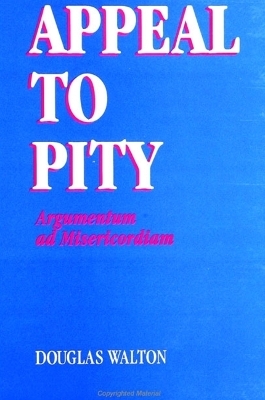
Appeal to Pity
State University of New York Press (Verlag)
978-0-7914-3461-1 (ISBN)
- Titel z.Zt. nicht lieferbar
- Versandkostenfrei
- Auch auf Rechnung
- Artikel merken
Appeal to pity has frequently been exploited with amazing success as a deceptive tactic of argumentation, so much so that it has traditionally been treated as a fallacy. Using a case study method, the author examines examples of appeals to pity and compassion in real arguments in order to classify, analyze, and evaluate the types of arguments used in these appeals. Among the cases studied are the controversial use of "poster kids" in the Jerry Lewis Telethon for Muscular Dystrophy and the "baby incubators story" deployed by a public relations firm to influence the decision to send U.S. forces into Kuwait during the Gulf War. In addition to the analyses of these and other case studies, this book provides, for the first time, precise guidelines and useful criteria with which to identify, analyze, and evaluate instances of the ad misericordiam argument.
Douglas Walton is Professor of Philosophy at the University of Winnipeg, Canada. He is the author of numerous books, including Plausible Argument in Everyday Conversation and Commitment in Dialogue: Basic Concepts of Interpersonal Reasoning, both published by SUNY Press, as well as Arguments from Ignorance; Argumentation Schemes for Presumptive Reasoning; A Pragmatic Theory of Fallacy; The Pace of Emotion in Argument; Slippery Slope Arguments; Begging the Question: Circular Reasoning as a Tactic of Argumentation; Practical Reasoning: Goal-Driven, Knowledge-Based, Action-Guiding Argumentation; and Informal Logic: A Handbook for Critical Argumentation.
Acknowledgments
Introduction
1. The Textbook Treatment
1. Irrelevance
2. Appeal to Pity as Inherently Fallacious
3. Not All Cases Fallacious?
4. Legal Cases
5. The Student's Plea Case
6. Excuses as Arguments
7. Charitable Appeals
8. Argument from Consequences
9. Judging the Fallacious Cases
10. Summary
2. Historical Background
1. Origins in the Modern Textbooks
2. Earliest Known Origins of Ad Misericordiam
3. Ancient Use as a Courtroom Tactic
4. Socrates' Rejection of Appeal to Pity
5. Aristotle on Appeal to Pity (Eleos)
6. The Stoic Condemnation of Pity
7. The Christian View of Pity
8. Sympathy as an Ethical Concept
9. Early Modern Views of Pity
I0. Terminological Questions
3. Identifying the Ad Misericordiam As a Type of Argument
1. The Jerry Lewis Telethon for Muscular Dystrophy
2. Negative Attitudes Towards Pity
3. A Definition of Pity
4. Mercy and Pity
5. A Pragmatic Concept of Empathy
6. A Definition of Sympathy
7. Compassion and Pity
8. The Speech on Health Security
9. Classification of the Types of Appeals
10. What's in a Name?
4. The Structure of the Argument
1. Arguments from Negative Consequences
2. Arguments from Need for Help
3. Argument from Distress
4. Charitable Appeals to Pity
5. Practical Reasoning
6. Evaluating Practical Reasoning
7. What Deliberation is About
8. The Case of Walter the Hardnosed Logician
9. Evolutionary Logic of Appeal to Feeling
10. Conclusions Summarized
5. The Nayirah Case
1. Facts of the Case
2. Analysis of the Case
3. Bias and Evidence
4. Evaluation of the Case
5. General Issues
6. The Kairos Factor
7. Staged Appeals to Pity
8. Twisting of the Argument
9. Fallaciousness of the Ad Misericordiam
10. Enstasis and Fallacy
6. When Is It a Fallacy?
1. Informal Logic and Forms of Argument
2. Use with Different Types of Argument
3. Suppressed Critical Questions
4. Impact Out of Context and Perspective
5. The Whole Evidence Requirement
6. Subtypes of Ad Misericordiam Fallacy
7. The Pragmatic View of Fallacy
8. Sensitivity to Context
9. Defining Relevance
10. The Logical Leap from Ethical Premises
7. Evaluation of Case Studies
1. Legal Uses of Appeal to Pity
2. The Menendez Case
3. The Baby Seals
4. Effectiveness of Ad Misericordiam Arguments
5. Comparing Cases
6. Further Comments on Cases
7. The Student's Plea Case Analyzed
8. The Thackeray Case
9. Summary of the Method
10. Revising the Textbooks
Notes
Bibliography
Index
| Erscheint lt. Verlag | 8.5.1997 |
|---|---|
| Reihe/Serie | SUNY series in Logic and Language |
| Zusatzinfo | Total Illustrations: 0 |
| Verlagsort | Albany, NY |
| Sprache | englisch |
| Maße | 152 x 229 mm |
| Gewicht | 508 g |
| Themenwelt | Geisteswissenschaften ► Philosophie ► Logik |
| ISBN-10 | 0-7914-3461-3 / 0791434613 |
| ISBN-13 | 978-0-7914-3461-1 / 9780791434611 |
| Zustand | Neuware |
| Informationen gemäß Produktsicherheitsverordnung (GPSR) | |
| Haben Sie eine Frage zum Produkt? |
aus dem Bereich


